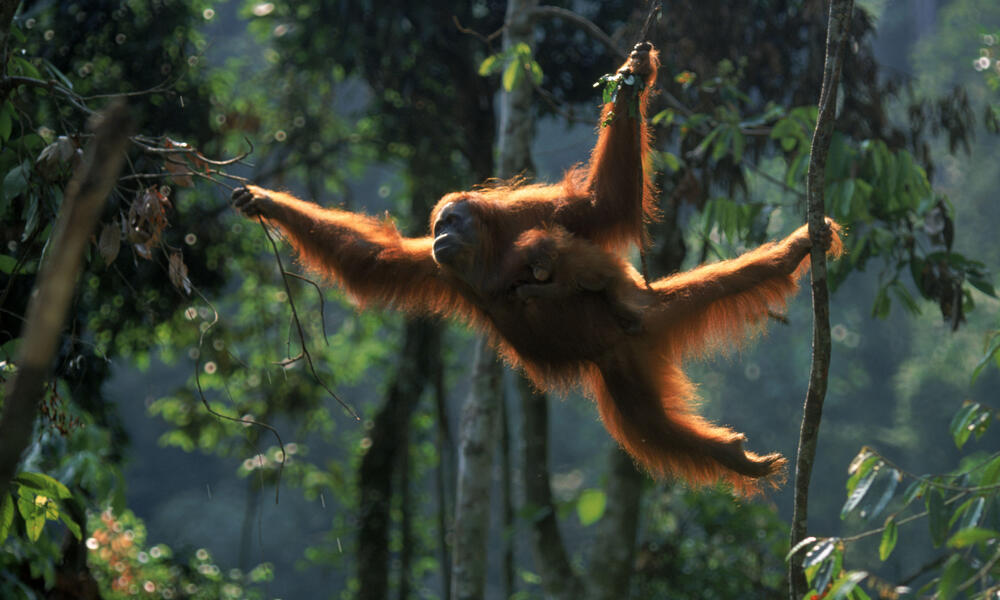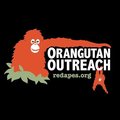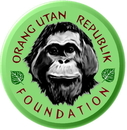Sumatran Orangutan - An Endangered Species
Sumatran Orangutan
- Description: Great ape with reddish-brown fur and high intelligence
- Population Estimates: Approximately 13,000 to 14,600 individuals in the wild (as of 2021).
- Conservation Status: Critically endangered due to deforestation, poaching, and human-wildlife conflicts
- Habitat: Tropical rainforests, lowland swamps, and mountain forests of Sumatra, Indonesia
- Behavior: Solitary, frugivorous, and capable of using tools for foraging
- Outside of breeding, generally solitary
Fun Fact: You can see the Sumatran Orangutan at the Cincinnati Zoo (video below, highly recommend with additional ways to protect this species):
Species Habitat
- Native to Sumatra, Indonesia
- Inhabits tropical rainforests, lowland swamps, and mountainous areas
- Spends most time in forest canopies
- May move seasonally to follow the availability of fruits
- Nests in high trees for resting and sleeping, making new nests each night
Species Role in Ecosystem
The Sumatran Orangutan plays a vital role in its ecosystem as a seed disperser, assisting in the regeneration of plant species and promoting forest diversity. By scavenging fruits and scattering seeds, the Sumatran Orangutan contributes to the growth and maintenance of various flora. As skilled climbers and canopy dwellers, they also influence the structure of the forest canopy, creating essential habitats for other organisms. These actions make the Sumatran Orangutan an ecological engineer, contributing significantly to the balance and health of its natural environment.
Cause of Decline
Habitat Loss
Deforestation, primarily influenced by the expansion of agricultural practices, logging, and oil plantations, has led to habitat destruction. As forests are cleared, the Sumatran Orangutan lose their natural habitat and access to their primary diets.
Illegal Hunting and Poaching
Often hunted for their meat, or captured for illegal pet trade. Poaching not only directly reduces their numbers and puts the species at risk of endangerment, but also disrupts social structures when the species are taken from their mothers.
Lack of Protection and Enforcement
In some areas of Indonesia, limited protection and weak law enforcement measures contribute to the illegal hunting and habitat destruction that threaten the species.
Why Should We Care?
The loss of the Sumatran Orangutan would mean a loss of scientific knowledge. The species are valuable subjects for scientific research, and their extinction would mean a loss of insight into primate behavior, intelligence, and evolution, which have implication for our understanding of human behavior as well. While studying the species in the wild is more difficult than in captivity, it has been proven to be much more effective.
Additionally, because the Sumatran Orangutan is a key seed disperser, the extinction of the species would disrupt the natural regeneration of plant species. The loss of this behavior could result in reduced biodiversity and alter the habitat composition, which would impact other flora and fauna that depend on these plants.
Current Conservation Efforts
Several conservation efforts have been put in place to protect the critically endangered Sumatran Orangutan.
Habitat Restoration
Efforts to restore degraded or deforested areas aim to create suitable habitats for orangutans and other wildlife, promoting natural regeneration and biodiversity.
Rehabilitation and Release Programs
Organizations run rehabilitation centers to rescue and care for orphaned or injured orangutans. When possible, these centers work to reintroduce them into the wild to boost wild populations.
The Sumatran Orangutan Conservation Program (SOCP) works to conserve viable wild populations of the critically endangered Sumatran orangutan. They do this by habitat protection, reintroduction of confiscated pets to the wild, education, survey work and scientific research.
Geographers, Geospatial tools, and Geography
Geographic Information Systems, a very popular technology used in wildlife monitoring, is often used to analyze and map the distribution of the Sumatran Orangutan and their habitat. The spatial information helps conservationists identify critical areas for protection.
One of the most important tools Geographers use is conservation corridors. Identification and design of these corridors connect fragmented orangutan habitats, enabling their movement and genetic exchange between populations.
How Can You Help?
There are several different organization that specialize in the conservation of the Sumatran Orangutan as well as their habitats that offer various ways to protect the species, including donation and volunteering.
Orangutan Outreach
"The mission is to protect orangutans in their native habitat while providing care for orphaned and displaced orangutans until they can be returned to their natural environment. They seek to raise and promote public awareness of orangutan conservation issues by collaborating with partner organizations around the world."
Sumatran Orangutan Society
"Work to raise awareness about the importance of protecting orangutans and their habitat; support grassroots projects that empower local people to become rainforest guardians; restore damaged orangutan habitat through tree planting programs; and campaign on issues threatening the survival of orangutans in the wild."
Centre for Orangutan Protection (COP)
"A direct action group of Indonesian people who campaign to bring an urgent end to the destruction of our rainforests and the killing of orangutans. COP strives to defend wild orangutans in Borneo forests from human brutality."
The Orangutan Project (TOP)
"Supports orangutan conservation, rainforest protection and reintroduction of orphans in order to save the species from extinction. TOP collaborates with several orangutan conservation projects, as well as providing habitat protection through its own Safeguard project - guard patrols that deter wildlife poaching, illegal logging and land clearing in Borneo and Sumatra. TOP provides technical and financial assistance directly to support conservation projects and orangutan rescue and rehabilitation centers."
The Orang Utan Republik Foundation (OURF)
"Mission is to save the orangutans of Indonesia through conservation education, outreach initiatives and innovative collaborative programs that inspire and call people to action. OURF believes that saving orangutans means saving their forest home, the rainforests of Borneo and Sumatra, and that the protection of this habitat can only be ensured by the people of Indonesia and Malaysia."







Comments
Post a Comment